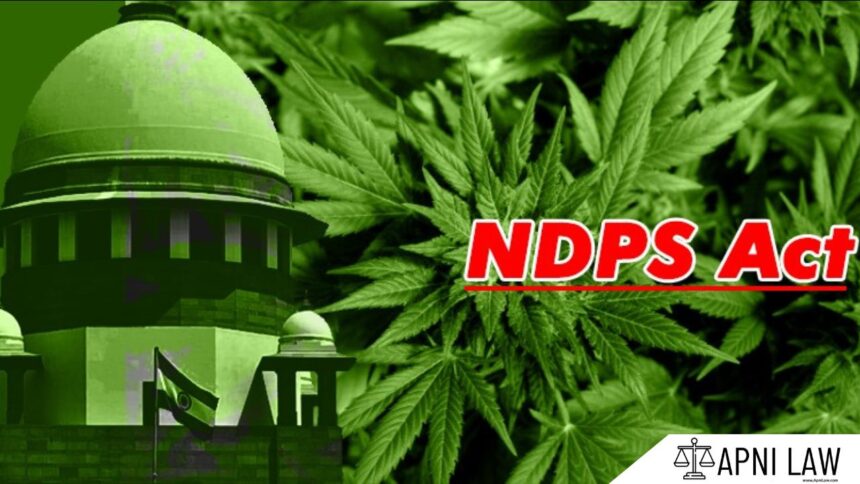This article is written by Atishay Jain, a former UPSC aspirant and a core member of the ApniLaw team. With a strong focus on criminal and regulatory law, the article offers clear insights into complex legislations like the Narcotic Drugs and Psychotropic Substances (NDPS) Act. For any personal queries or suggestions, feel free to reach out to us through our official channel.
The Narcotic Drugs and Psychotropic Substances (NDPS) Act, 1985 is a major law in India that tackles drug trafficking and drug abuse. This law regulates operations related to narcotic drugs and psychotropic substances. The NDPS Act operates alongside other legislation, such as the Drugs and Cosmetics Act, 1940.
In certain cases, courts have had to determine the appropriate legal framework for prosecution. In NCB vs. Rajesh Sharma & Ors., the court analyzed whether to try the accused under the NDPS Act or the Drugs and Cosmetics Act and decided based on the substance’s nature and quantity.
What Is Section 8 Of The NDPS Act?
Section 8 of NDPS Act prohibits the production, manufacture, possession, sale, purchase, transport, and use of narcotic drugs and psychotropic substances. It aims to prevent drug abuse and ensure control over illegal drug activities in India.
What Activities Are Prohibited Under Section 8 Of NDPS Act?
- Ban on Cultivation of Coca Plant. The law prohibits the cultivation of any coca plant in India.
- No Gathering of Coca Leaves or Parts. Gathering any part of the coca plant is illegal without permission.
- Prohibition on Opium Poppy Cultivation. Growing opium poppy plants without authorization is banned.
- Cultivation of Cannabis Plants Is Restricted. Section 8 also bans the cultivation of cannabis plants.
- No Production or Manufacture of Banned Substances. Producing or manufacturing narcotic drugs or psychotropic substances without a license is strictly prohibited.
- Possession Without Authorization Is Illegal. Possessing narcotic drugs or psychotropic substances without permission invites strict penalties.
- The law bans individuals from selling, purchasing, or trading narcotic drugs and psychotropic substances without a license.
- Transportation and Warehousing Restrictions. Moving or storing narcotic drugs and psychotropic substances without authorization is prohibited.
- Use and Consumption Without Permission Are Offenses. Using or consuming narcotic drugs or psychotropic substances without permission is illegal.
- Strict Ban on Import and Export. Importing or exporting narcotic drugs and psychotropic substances, both within India (inter-State) and internationally, is prohibited.
- No Unauthorized Trans-shipment. Trans-shipping narcotic drugs or psychotropic substances across locations without permission is also banned.
What Are The Exceptions Under This Section?
Section 8 allows activities involving narcotic drugs or psychotropic substances only when:
- It follows the procedures outlined in the NDPS Act, its rules, and official orders.
- Terms and conditions of the license are fully complied with.
- Authorized cultivation for medical or scientific purposes is allowed under strict government control.
- The Act permits it only for research or medical uses with proper licensing.
- Licensed cultivation for medical needs, such as morphine production, is allowed.
- Licensed pharmaceutical companies or research institutions can carry out production under regulations.
- Individuals or organizations with proper licenses for medical or scientific purposes may possess these substances.
- Transactions under medical prescriptions or licensed companies are allowed.
- Licensed transporters and warehouses can handle them under strict regulatory conditions.
- Patients prescribed with certain drugs for treatment are allowed under medical supervision.
- Licensed agencies can import or export for medical, scientific, or industrial purposes.
- Licensed operations under regulatory guidelines can conduct transshipment.
- Mere claims of medical or scientific purpose do not exempt one from penalties without official authorization.
What Are The Penalties for Violating Section 8 of the NDPS Act?
Breaking the prohibitions under Section 8 results in heavy penalties. The punishment depends on the quantity and type of substance involved.
Penalty for Small Quantities
- Rigorous imprisonment up to 1 year, or
- Fine up to ₹10,000, or
- Both imprisonment and fine.
Penalty for Quantity Larger Than Small But Less Than Commercial
- Rigorous imprisonment up to 10 years.
- Fine up to ₹1 lakh.
What Is The Penalty for Commercial Quantities
- Minimum 10 years of rigorous imprisonment, extendable to 20 years.
- Fine between ₹1 lakh and ₹2 lakhs, which can increase further if the court records reasons.
Special Penalties
- Repeat offenders can face double punishment or even the death penalty in rare cases involving huge quantities.
- Financing illicit traffic or harboring offenders leads to imprisonment between 10 and 20 years with heavy fines.
- Offences under the NDPS Act are cognizable and non-bailable. Bail is difficult to obtain unless strict conditions are satisfied.
- Convicted persons cannot get their sentences suspended, remitted, or commuted (except for minor offenses under Section 27).
What Are The Recent Amendments Related To This Section ?
- The NDPS (Amendment) Act, 2021 corrected a mistake from the 2014 amendment. It fixed the definition of “illicit traffic” under Section 27A and aligned penalties accordingly.
- A new Section 27-B was added to penalize contravention of Section 8A. Punishment includes rigorous imprisonment from 3 to 10 years and a fine.
- Courts have clarified that Section 8(c) covers all activities like production, manufacture, possession, use, transport, and sale unless done legally for medical or scientific purposes.
- The fundamental prohibitions under Section 8 remain unchanged.
Medical and scientific exceptions are still narrowly interpreted and strictly regulated.
Recent Case On Section 8 Of NDPS Act
In January 2025, the Delhi High Court denied bail to an accused involved in a case under Sections 8, 22, 23, and 29 of the NDPS Act. The accused attempted to collect 1880 grams of MDMA using a false identity. The court found that the accused failed to meet the twin conditions under Section 37 of the NDPS Act, which are prerequisites for granting bail in such cases.
The accused tried to collect a parcel containing 1880 grams of MDMA using a fake identity, indicating a deliberate attempt to evade detection.
The quantity of MDMA involved was significantly above the commercial threshold, which is 10 grams, thereby attracting stricter provisions under the NDPS Act.
Section 37 of the NDPS Act allows the court to grant bail only if it believes the accused is not guilty and is unlikely to commit another offense while on bail. In this case, the court ruled that the accused failed to meet these conditions.
The Delhi High Court dismissed the bail application, emphasizing the seriousness of the offense and the potential risk of the accused committing further offenses if released. The court’s decision underscores the stringent approach taken in cases involving large quantities of narcotic substances under the NDPS Act.
Conclusion
The NDPS Act, 1985, especially Section 8, sends a strong message, unauthorized dealings with narcotic drugs and psychotropic substances are not tolerated.
Enforcing Section 8 poses challenges, especially concerning substances used in both medical and illicit contexts. Authorities must differentiate between legitimate medical use and unauthorized distribution. This necessitates stringent checks and balances to prevent misuse while ensuring that medical needs are met.










